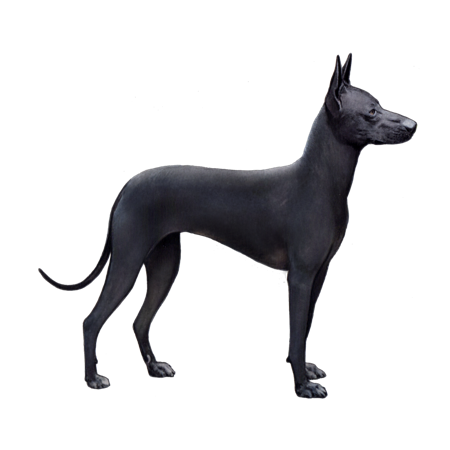
Airedale Terrier
The Airedale is the largest terrier breed and is sometimes known as “the King of Terriers.” This jolly dog is friendly, and they usually socialize well with people and other dogs. They aren’t known to be mischievous, and instead are quite adaptable to any living situation.
Interested in discovering if your dog is an Airedale Terrier?
Check out Wisdom Panel's DNA tests.

Airedale Terrier Traits
General Appearance
This medium-sized breed is the biggest of the terrier group, with a well-balanced head, V-shaped ears, and small, dark eyes that are full of life.
Coat and Colouring
The Airedale Terrier has a dense, hard, and wiry coat that can be slightly wavy in areas. They are black and tan or dark grizzle and tan.
Distinctive Physical Traits
While the Airedale has many of the same characteristics you’ll find in other members of the terrier family, the breeds’ larger-than-average size sets it apart. These dogs are sturdy and muscular, with males measuring about 23 inches in height at the shoulders.
Airedale Terrier Temperament
Though it’s a skilled hunter, the Airdale is calm and eager to please at home with its family. As a social dog, Airedales get along well with people and other animals, and they make a great family pet—but remember that they don’t love being left alone for long. The breed doesn’t generally tend to get into trouble, but the proper amount of exercise and mental stimulation can keep them from getting bored.


Airedale Terrier History
The Airedale Terrier hails from the Aire Valley in the north of England. During the height of the Industrial Revolution in the mid-19th century, factory workers set out to breed the Airedales as large, fearless hunters of rats and ducks. To create these hunting dogs, they included Otterhounds and a few breeds that are now extinct, like the English Black and Tan Terrier. Some believe that the Setters, Retrievers, and some herding dogs also went into the original Airedale.
The breed went on to serve with the British Armed Forces during the First World War, during which they acted as guard dogs and messengers. In the United States, the Airedale got a reputation for being an apt hunting dog, tracking down animals on land and water. Today, fans of the breed celebrate the Airdale’s versatility and companionship.
Airedale Terrier Care
Nutrition
The Airedale is an active breed that does best with high-quality dog food that’s suited to their particular age, as well as any additional health concerns.
As with any dog, it’s important to monitor the amount of food and treats that you give your Airedale, especially since some dogs may be prone to gaining weight as they age. Your veterinarian is always a good source to help provide you with appropriate nutrition and feeding guidelines.
Grooming
The Airedale has a short, wiry coat that requires minimal care. If you brush your Airedale’s coat once a week to remove loose and dead hair, their coat should remain strong and healthy. Getting your Airedale professionally groomed three or four times a year, in addition to your weekly sessions, will keep them in even better shape.
All dogs require regular dental care, including at-home teeth brushing and professional dental cleanings, and the Airedale is no exception. Maintaining good dental hygiene is important for their overall long-term health.
Exercise
Like any terrier, the Airedale is full of energy and requires a lot of activity to remain happy and healthy. They love any activities involving their family, like going on walks and or playing fetch in the backyard.
Training
Training is important for an Airedale since they are natural-born hunters and can be rambunctious. Luckily, Airedales aim to please their people, so they take well to training.
Even if you have a well-trained Airedale, be sure to always keep this breed on a leash or in a secure area when they are outside. Their instinct to hunt is strong, and it can take over at a moment’s notice.

Airedale Terrier Genetic Health Conditions
-
Factor VII Deficiency
Factor VII Deficiency is an inherited blood clotting disorder that results in excessive bleeding occurring after a severe trauma or surgery. The signs of the disease are typically mild but can vary in severity in different affected dogs.
-
Hemophilia B (Discovered in the Airedale Terrier)
Hemophilia B, also known as Factor IX Deficiency, is a blood clotting disorder most commonly seen in male dogs, which can result in prolonged bleeding after an injury or a surgical procedure.
-
Lung Developmental Disease (Discovered in the Airedale Terrier)
Lung developmental disease in Airedale Terriers is characterized by lethal hypoxic respiratory distress and failure that occur within the first days or weeks of life in affected puppies.
-
Protein Losing Nephropathy
Protein Losing Nephropathy (PLN) is a disorder in which affected dogs lose protein through their kidneys, leading to kidney failure over time. This variant has been identified in Airedale Terriers and Soft Coated Wheaten Terriers.
Knowing if your Airedale Terrier is a carrier or at-risk for these conditions can help you and your veterinarian plan for your pup's lifelong care. With Wisdom Panel™ Premium, you can get results for over 200 genetic health tests.
Breed Group
Terrier
The Terrier Group ancestors were bred to hunt and kill vermin. They are often characterized as feisty and energetic dogs whose sizes range from fairly small to much larger.































































